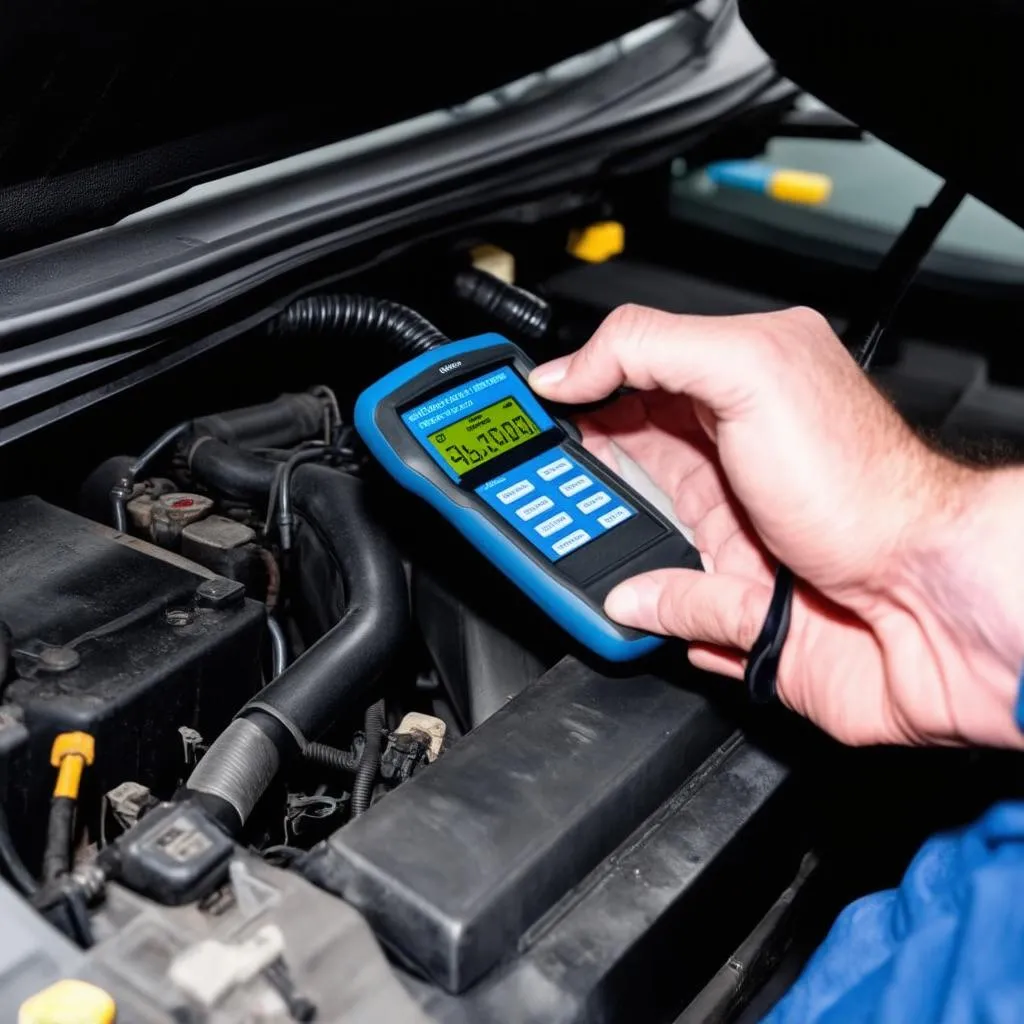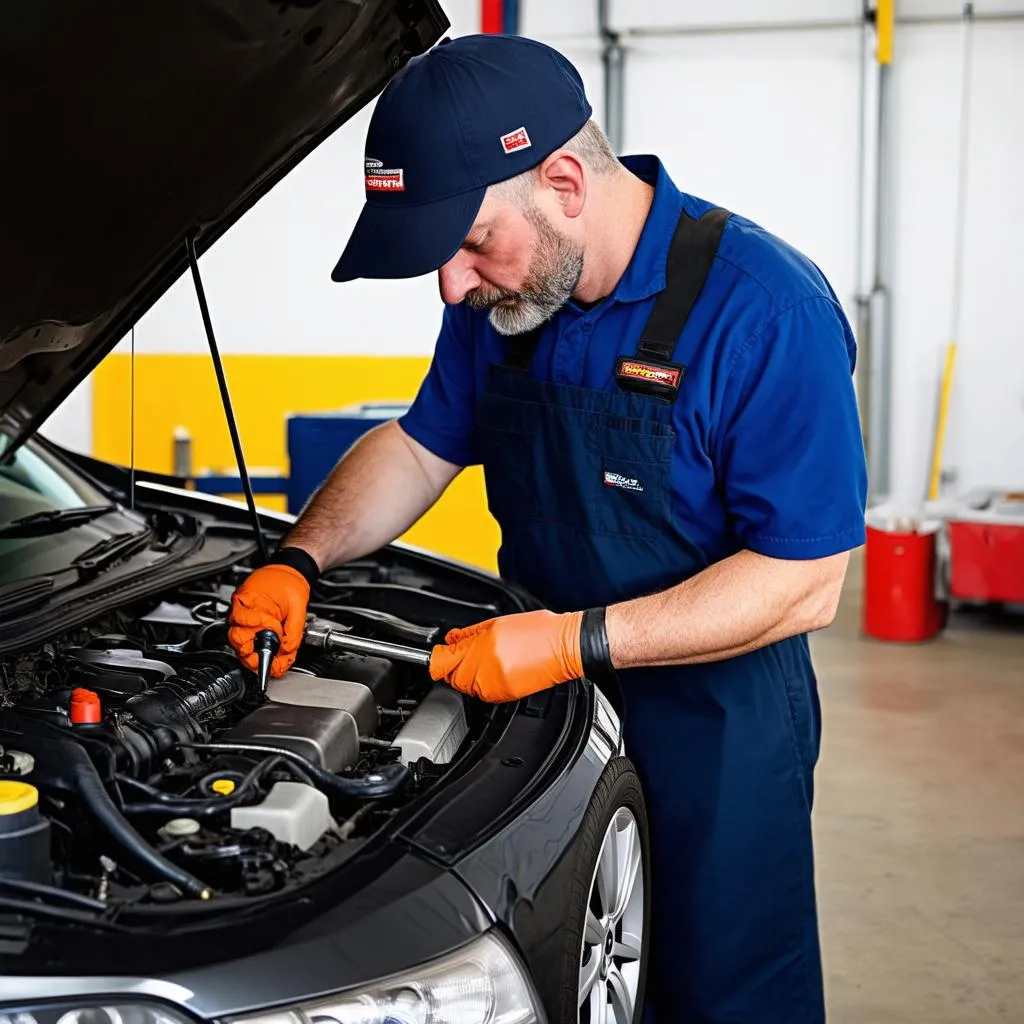Picture this: You’re cruising down the Pacific Coast Highway in your trusty 2001 Beetle 1.8T, wind in your hair, not a care in the world. Suddenly, that dreaded Check Engine light pops up on your dashboard like an unwelcome guest. A quick trip to your mechanic reveals the cryptic OBD code 17525. What does it mean? More importantly, what do you do about it?
Don’t worry, fellow Beetle enthusiast, we’ve got you covered! This article delves into the mysteries of the 17525 OBD code, deciphering its meaning and offering practical solutions to get your beloved Beetle back on the road.
Understanding the Language of Your Car: OBD Code 17525
Just like humans use language to communicate, cars have their own language – OBD codes. Think of them as your car’s way of telling you something’s not quite right. OBD code 17525, specifically in a 2001 Beetle 1.8T, usually indicates a problem with the Long Term Fuel Trim Additive Air, Bank 1 – System too Rich.
What does “System too Rich” even mean?
In simple terms, it means the engine is receiving too much fuel compared to air. This imbalance can lead to decreased performance, poor fuel economy, and potentially even damage your catalytic converter in the long run. Imagine trying to bake a cake with too much flour – it’s just not going to turn out right!
Causes and Solutions: Getting to the Root of the Problem
Several culprits could be causing your Beetle to throw this particular code:
-
Faulty Oxygen Sensor: This sensor acts like the baker’s keen eye, measuring the oxygen levels in the exhaust to ensure the fuel-air ratio is just right. A malfunctioning sensor might be misreading the levels, leading to an overly rich mixture.
-
Leaky Fuel Injectors: These little guys are responsible for spraying the right amount of fuel into the engine. A leaky injector can over-fuel the engine, much like an overzealous bartender pouring one too many shots.
-
Vacuum Leaks: Your engine needs a delicate balance of pressure to function correctly. Vacuum leaks can disrupt this balance, throwing the fuel-air mixture out of whack. Imagine a tiny hole in a straw – it makes it much harder to get the right amount of liquid!
-
Faulty Fuel Pressure Regulator: This component ensures the fuel pressure remains at an optimal level. A faulty regulator can lead to excessive fuel pressure, resulting in – you guessed it – a rich fuel mixture.
Diagnosing the Issue: A Step-by-Step Approach
- Check for Vacuum Leaks: Start by visually inspecting all the vacuum hoses for cracks or loose connections.
- Inspect Fuel Injectors: A mechanic can check the injectors for leaks or clogs.
- Test the Oxygen Sensor: A professional-grade OBD scanner can be used to monitor the oxygen sensor readings and determine if it’s functioning properly.
- Inspect Fuel Pressure Regulator: A mechanic can test the fuel pressure to ensure it’s within the recommended range.
Don’t Ignore the Signs: The Importance of Prompt Action
Ignoring OBD codes can be tempting, especially when your car seems to be running fine. However, delaying repairs can exacerbate the issue, leading to costlier repairs down the line.
Think of it this way: Ignoring a small crack in your windshield might seem harmless initially, but over time, that crack can spread, obscuring your vision and potentially leading to a dangerous situation. Similarly, addressing OBD codes promptly ensures your car remains in tip-top shape.
 OBD Scanner Diagnostics
OBD Scanner Diagnostics
FAQs: Addressing Your Burning Questions
Can I drive my car with code 17525?
While you might be able to drive for a short distance, it’s not advisable. Driving with a rich fuel mixture can damage your catalytic converter, a costly component to replace.
How much does it cost to fix OBD code 17525?
The cost depends on the underlying cause. A simple oxygen sensor replacement might cost a few hundred dollars, while a more complex issue like a faulty fuel pressure regulator could cost significantly more.
Can I fix this code myself?
While some repairs might be within the skillset of a DIY enthusiast, it’s generally recommended to have a qualified mechanic diagnose and fix the problem.
Need a Hand? We’re Here to Help!
We understand that dealing with car troubles can be frustrating. If you’re experiencing issues with your 2001 Beetle 1.8T or any other vehicle, our team of expert mechanics is here to help. Contact us on WhatsApp at +84767531508 for expert advice and assistance with all your automotive needs.
Beyond the Code: A Holistic Approach to Car Care
While this article focused on the technical aspects of OBD code 17525, it’s essential to remember that car maintenance goes beyond just fixing what’s broken. Regular maintenance, including oil changes, fluid checks, and tire rotations, can prevent many issues from arising in the first place.
Think of it like taking care of your own health – regular checkups and healthy habits can prevent minor issues from escalating into major problems. Similarly, a proactive approach to car care ensures your vehicle remains reliable and road-ready for years to come.
 Car Mechanic Repair
Car Mechanic Repair
Explore Further: More Insights Await
Looking for more helpful tips and advice on maintaining your vehicle? Check out these other informative articles on techcarusa.com:
- [Common OBD Codes and Their Meanings]
- [DIY Car Maintenance Tips for Beginners]
- [Choosing the Right Mechanic for Your Car]
Remember, knowledge is power when it comes to car ownership. Armed with the right information and resources, you can keep your beloved Beetle running smoothly for miles to come.